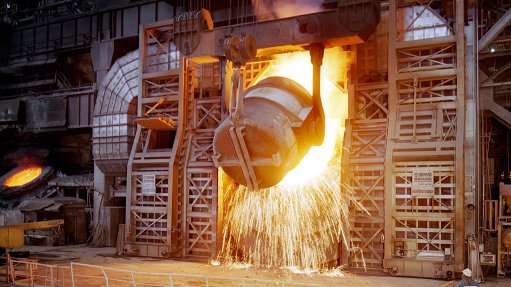
IMPROVING ENERGY EFFICIENCY The metals industry is looking for ways to reduce its energy needs and reduce its carbon dioxide footprint
Energy costs comprise a material portion of steel production costs and, in addition to using energy to melt and shape steel, auxiliary plants – such as those used for gas cleaning – also contribute significantly to energy consumption, says metallurgical processing plant supply company SMS Group South Africa.
To deal with this challenge, SMS Group uses the Ecoplant system, which includes solutions and products that offer economical and ecological advantages, says SMS Group South Africa MD Pieter Bezuidenhout.
He says the company’s electrical and automation department uses high-level automation and high-tech electrical instruments to implement the Ecoplant system.
“Available process information and measurements are used for this purpose and are evaluated [using] mathematical, metallurgical and stochastic models. “The result is intelligent control systems that help to increase energy and process efficiency.”
Bezuidenhout tells Engineering News that these systems are frequently used as a standard in SMS Group’s new processes and, as such, they are tried and further developed in various ways. “In most cases, they can easily be retrofitted, which increases value add in modernisation projects.”
The Ecoplant system helps to improve the energy efficiency of gas-cleaning systems in steelworks, which are responsible for the extraction of dust-laden offgases. The Ecoplant uses an algorithm to calculate the optimal opening positions of the exhaust air dampers and the required negative pressure.
“It has shown, in practice, that average energy savings of 21% can be reached, which equates to a few million rands a year,” says Bezuidenhout.
Gas-Cleaning Consumption
Bezuidenhout says gas cleaning at steelworks is, more often than not, not implemented efficiently, but that there is significant potential for improvement in this area.
“Gas cleaning has been a somewhat neglected auxiliary unit in the past. “However, to comply with environmental specifications and to receive an operating licence, as well as ensure economic operations, current plants have to be significantly more efficient with regard to energy consumption.”
He says that, to comply with statutory limit values for dust concentration at SMS Group’s plants, the numbers of extraction points are continuously increased. The growing amounts of exhaust gases produced in this way are then extracted with energy-intensive fixed-speed induced-draft fans.
“However, the fixed-speed fans lack flexibility. “Only by controlling the negative pressure at the gas inlet to the filter house is it possible to control the overall system to ensure the required extraction capacity at all extraction points,” explains Bezuidenhout.
Meanwhile, SMS Group also uses the X-Pact Gas Cleaning Assistant to improve gas-cleaning quality and reduce the system’s reliance on electricity, as it makes adequate gas extraction capacity available.
The gas-cleaning assistant is an intelligent control unit that optimises gas-cleaning quality. The unit is used as a standard across all new SMS Group gas-cleaning plants, though it is also easy to retrofit and offers great advantages in modernisation projects, says Bezuidenhout.
The X-Pact includes intelligent process monitoring, which ensures reliability in long-term planning for the operation and servicing of the plant; this ensures that the system recognises premature wear of the exhaust air flaps and provides a forecast for the amount of dust present in the filter compartment, Bezuidenhout concludes.